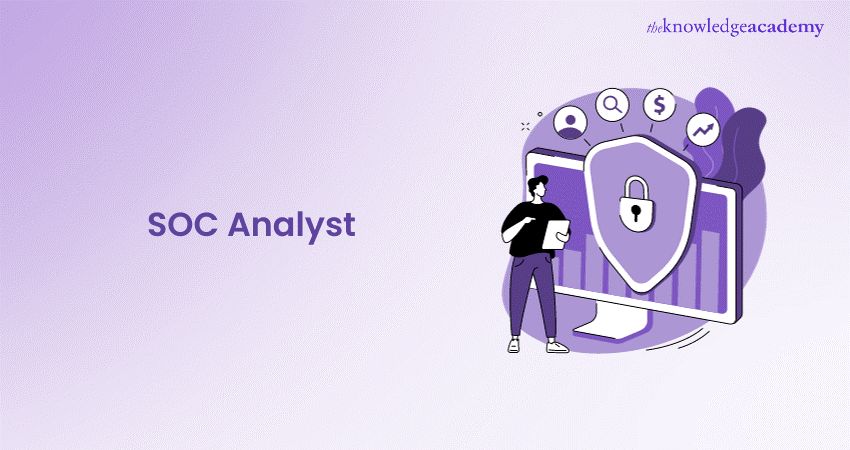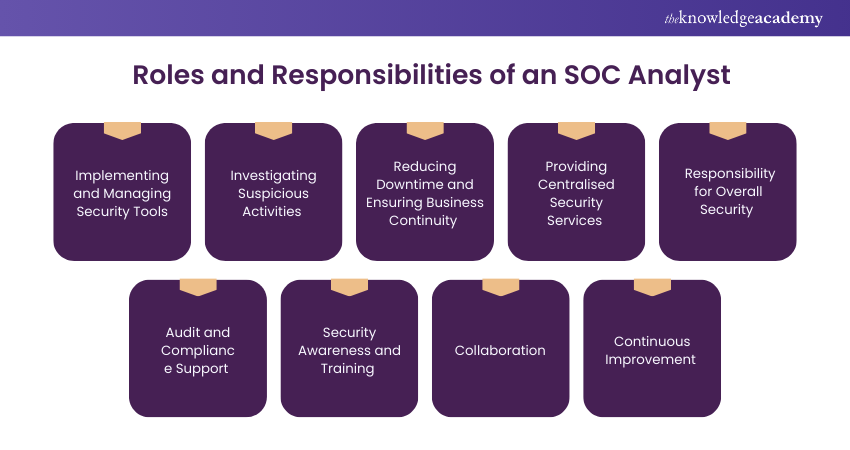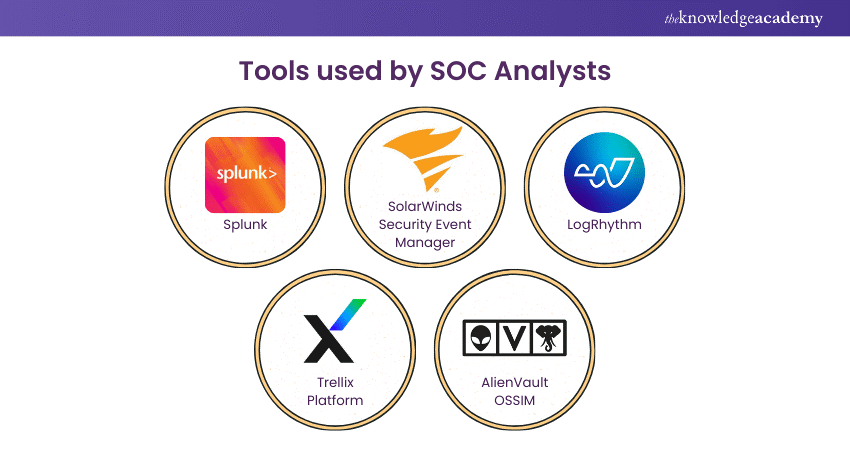We may not have the course you’re looking for. If you enquire or give us a call on +47 80010068 and speak to our training experts, we may still be able to help with your training requirements.
Training Outcomes Within Your Budget!
We ensure quality, budget-alignment, and timely delivery by our expert instructors.

Are you aware of the importance of protecting sensitive information in today's interconnected digital world? Security Operations Center (SOC) Analysts play a crucial role in modern security operation centres, which are now integral to every organisation. These experts monitor, analyse, and respond to security issues as part of a dedicated SOC team.
SOC Analysts build situational awareness and prepare companies for potential security threats by investigating attacks alongside team members. Their role is necessary for maintaining a secure digital environment, which is why the demand for SOC Analysts is rapidly increasing. According to Glassdoor, SOC Analysts make around 30,336 GBP a year in the United Kingdom.
Table of Contents
1) What is SOC?
2) Who is a SOC Analyst?
3) SOC Analyst Job Description Template
4) Roles and Responsibilities of an SOC Analyst
5) Skills and Qualifications of SOC Analysts
6) Salary of an SOC Analyst
7) Tools for an SOC Analyst
8) Conclusion
What is SOC?
SOC stands for Security Operations Center, and it is a centralised unit for security operations in a company. Every company builds an SOC team with the main aim of monitoring, analysing, and protecting the company and its assets from security threats. These threats include cyber-attacks, data breaches, viruses, malware, and more.
SOC stands for Security Operations Center, and it is a centralised unit for security operations in a company. Every company builds an SOC team with the main aim of monitoring, analysing, and protecting the company and its assets from security threats. These threats include cyber-attacks, data breaches, viruses, malware, and more
A SOC Analyst and the SOC team protect the sensitive data and information of a company stored on computer devices. Their main aim is to prevent hackers from accessing this information and using it for malicious activities and purposes. It may include important company Data integrity of the systems or the company's confidential information.
The SOC team of a company is responsible for strategising and implementing various methods to maintain the organisation's Cyber Security. As the main point of contact, they play a crucial role in preventing and avoiding cyber-attacks.
Who is a SOC Analyst?
To understand what SOC Analysts, do, it's essential to know their role. An SOC Analyst is a professional responsible for a company's Cyber Security and security operations. They are the first responders to cyber-attacks, identifying, analysing, and resolving security issues.
Additionally, they inform management about cyber threats, enabling stakeholders to take necessary measures to protect the company's data and sensitive information from hackers and malicious activities.
An SOC Analyst can be described as someone who reviews incident notifications and performs multiple vulnerability assessments. They then derive conclusions from these assessments and report their findings to senior management. So, it is clear that if you want to become an SOC Analyst, you will need to take care of the security operations of the company you work for. You will also be responsible for safeguarding the company's data.
Stay vigilant and protect your digital life! Embrace Cyber Security Awareness today and shield your online world from threats. Join our Cyber Security Awareness Course today!
SOC Analyst Job Description Template
Now, lets' take a look at two SOC Analyst Job Description Job Description Templates
Template 1
|
Job Title: SOC Analyst Location: [City, State] or Remote Job Description: SOC Analysts at [Company Name] are responsible for protecting and safeguarding the company resources in the digital world. Security incidents will be observed and managed, with vulnerability assessments being carried out and recommendations offered to the top management. Some of the tasks that you will be expected to perform will include working with other departments in ensuring that the organisation’s security status is constantly improved. Responsibilities: • Evaluating the traffic of a network to identify possible security vulnerabilities. • Conduct vulnerability scans and penetration tests to identify areas of risk. • To deal with the security matters such as an event or an alarm, report to the other sections if required. • Personally investigated security breaches and produced comprehensive reports on each of them. • Write operational procedures and guidelines for security measures. • Coordinate with IT and other organisational units to ensure measures are coordinated and effective. • Train and sensitise the employees of the organisation on the factors to consider while working online. • Maintain relevance with the information security current affairs, products and solutions. • Comply all the security standards and policies as required by the law. • The final mitigation of operational risk is to maintain and update incident response plans. Requirements: • A degree in Information Technology, Computer Science, Cyber Security, or a related field. • Proven experience as a SOC Analyst or in a similar role. • Strong knowledge of Cyber Security principles and practices. • Proficiency with security tools and technologies such as SIEM, IDS/IPS, and firewalls. • Excellent analytical and problem-solving skills. • Strong communication skills and the ability to report on complex security issues clearly. • Capability to work effectively in a team environment. • Attention to detail and a commitment to maintaining high standards of security. |
Template 2
|
Job Title: Senior SOC Analyst Location: [City, State] or Remote Job Description: Having a position of Senior SOC Analyst at [Company Name], you will be responsible for providing Cyber Security for the organisation’s systems. Your responsibilities include; advanced threat identification, security incident handling, and mentoring other subordinates in the SOC Analyst team. You will also have coordination responsibilities with other departments to facilitate the process of the organisations implementing their strategic security measures. Responsibilities: • Lead the monitoring and analysis of security events and incidents. • Conduct advanced threat hunting and forensic investigations. • Develop and refine incident response strategies and protocols. • Mentor and guide junior SOC Analysts, providing training and support. • Coordinate with other departments to design and implement security solutions. • Analyse and interpret security data to identify trends and potential threats. • Prepare and deliver detailed reports on security incidents and threat assessments. • Stay current with emerging security threats and technologies. • Ensure compliance with industry standards and regulatory requirements. • Maintain and enhance security infrastructure and tools. Requirements: • A degree in Computer Science, Information Security, Cyber Security, or a related field. • Extensive experience as a SOC Analyst or in a senior Cyber Security role. • In-depth understanding of advanced Cyber Security threats and mitigation strategies. • Proficiency with sophisticated security tools and technologies. • Excellent leadership and mentoring skills. • Strong analytical abilities and attention to detail. • Exceptional communication abilities, adept at explaining intricate security matters to different audiences. • Proficient in both independent work and collaborative team settings. • Dedicated to continuous education and advancement in the field of Cyber Security. |
Roles and Responsibilities of an SOC Analyst
SOC plays a crucial part in ensuring the security of company operations. Here are some roles and responsibilities of SOC Analysts:

1) Implementing and Managing Security Tools
SOC Analysts have access to critical technologies within the company to ensure data security and create a safe environment. That is why they manage security tools that include firewalls, threat and vulnerability management systems, data security tools, intrusion detection and prevention technology, and data analytics platforms. Also, they utilise the forensic tools to counter investigations throughout the periods of security threats.
2) Investigating Suspicious Activities
SOC Analysts proactively search IT systems and networks for security threats using modern tools. When alerted by the Security Information and Event Management (SIEM) system, they analyse threats and take necessary actions.
3) Reducing Downtime and Ensuring Business Continuity
SOC Analysts play a crucial role in minimising downtime during security incidents. Instead of shutting down infected servers completely, they take measures to mitigate risks without disrupting critical business operations.
4) Providing Centralised Security Services
SOC Analysts offer valuable insights to upper management, helping stakeholders make informed decisions. They collaborate with multiple departments to ensure comprehensive data security across the organisation.
5) Responsibility for Overall Security
SOC Analysts are at the forefront of handling security breaches. Clear communication and authority lines are essential for them to maintain effective security operations.
6) Audit and Compliance Support
SOC Analysts perform audit activities to meet compliance requirements for corporate, government, and public offices. Compliance areas include patch levels, threat information, identity management, and data access control. They ensure the organisation's security practices comply with relevant regulations, standards, and industry best practices. Assist in compliance audits and reporting.
7) Security Awareness and Training
Stay current with security best practices and emerging threats through ongoing training and certification. They educate and train employees and other stakeholders on security awareness and incident response protocols.
8) Collaboration
Work closely with other IT and security teams, including network administrators, system administrators, and threat hunters. This will ensure a cohesive and effective security strategy.
9) Continuous Improvement
SOC Analysts participate in the evaluation and enhancement of the SOC's tools, processes, and procedures to increase its efficiency and effectiveness.
Skills and Qualifications of SOC Analysts
A Security Operations Center (SOC) Analyst needs to have technical expertise and soft skills to excel in their role. Let’s explore the key requirements:
1) Technical Proficiency
a) SIEM Tools: An SOC Analyst should be proficient in using Security Information and Event Management (SIEM) tools like Splunk, ArcSight, or ELK Stack. These tools help monitor and correlate security events.
2) Networking Knowledge
a) Networking Protocols: Understanding networking protocols (e.g., TCP/IP, DNS, HTTP) is essential for analysing network traffic and identifying anomalies.
b) Intrusion Detection/Prevention Systems (IDS/IPS): Familiarity with IDS/IPS solutions enables timely threat detection and prevention.
c) Malware Analysis: Basic knowledge of malware analysis techniques helps identify and assess threats.
3) Soft Skills
a) Analytical Thinking: Analytical Thinking SOC Analysts must analyse complex incidents, identify patterns, and make informed decisions promptly.
b) Effective Communication: Clear communication (both written and verbal) is crucial for documenting incidents and collaborating with other teams.
c) Attention to Detail: Detecting subtle signs of compromise requires meticulous attention.
d) Calm Under Pressure: During security incidents, staying composed and focused is essential.
4) Certifications
Relevant certifications enhance credibility. Some of the common certifications include:
a) CompTIA Security
b) Certified Information Systems Security Professional (CISSP)
c) Certified Ethical Hacker (CEH)
d) GIAC Security Essentials (GSEC)
5) Continuous Learning
The Cyber Security landscape evolves rapidly. Therefore, SOC Analysts should stay updated on emerging threats and best practices.
6) Understanding of Compliance Frameworks
Familiarity with industry-specific compliance standards (e.g., PCI DSS, HIPAA, GDPR) ensures adherence to legal requirements.
7) Experience
Hands-on experience in security monitoring or incident response significantly enhances a SOC Analyst's capabilities.
Protect your digital assets today and fortify your future by Joining our Cyber Security Risk Management Course today!
Salary of SOC Analyst
An SOC Analyst's salary varies based on factors such as experience, location, and organisation. On average:
1) Entry-level Analysts earn around £38,868
2) Mid-level Analysts earn around £50,000
3) Senior Analysts with extensive experience can earn over £60,000 annually
These figures are approximate and can vary. SOC Analysts play an important role in safeguarding organisations from cyber threats, and their expertise ensures secure operations in an increasingly digital world.
|
Country |
Average Annual Salary (Local Currency) |
|
United Kingdom |
£25,000 - £37,000 (GBP) |
|
India |
₹4,00,000 - ₹8,00,000 (INR) |
|
Singapore |
SGD 1,15,000 - SGD 10,86,000 (SGD) |
|
United States |
$70,000 - $115,000 (USD) |
|
Canada |
CAD 45,000 - CAD 90,000 (CAD) |
|
United Arab Emirates (Dubai) |
AED 29,000 - AED 73,000 (AED) |
|
Australia |
AUD 70,000 - AUD 140,000 (AUD) |
Source: Glassdoor
Tools used by SOC Analysts

Having the right tools is crucial for effective threat detection, incident response, and overall security management. Here are some of the top tools that SOC Analysts can use:
Splunk
Splunk takes information from all aspects of a network. This makes it easier for Analysts to find relevant data and act quickly in on-site, hybrid and cloud database environments. Whenever an anomalous event occurs that suggests a potential breach, SOC Analysts can efficiently and easily access database information. This enables them to respond appropriately to the threat.
SolarWinds Security Event Manager
SolarWinds Security Event Manager provides Analysts with a tool that improves security through advanced threat identification, automated incident responses and forensic analysis. They offer a dashboard for monitoring security events. Additionally, it integrates with various compliance reporting tools to help businesses conform to HIPAA, PCI DSS, and other regulations.
LogRhythm
LogRhythm’s SIEM platform provides a secure method to enhance an organisation’s security posture. This is particularly essential when facing challenges associated with the rise in remote work and cloud migration.
This platform applies a zero-trust model while optimising security infrastructures against new Cyber Security threats. LogRhythm provides additional training that helps different types of IT professionals use its features correctly.
Trellix Platform
This platform provides real-time visibility into system activity. The tool allows Analysts to see real-time system, network, application, and database activity and performance.
When Trellix is fully integrated into a system, Analysts can examine specific events to identify potential issues. These issues can range from suspicious activity to slow speeds. Trellix users can also add content packs to customise the tool for relevant industry compliance regulations.
AlienVault OSSIM
AlienVault OSSIM is an open-source SIEM product by AT&T designed to help security professionals with asset discovery and assessing vulnerabilities. It also supports intrusion detection, behaviour monitoring, and SIEM event correlation.These tools play an important role in enhancing organisations' security monitoring and incident response capabilities.
Secure your future to become the digital guardian of tomorrow by joining our Cyber Security Training today!
Conclusion
SOC Analysts are like the guardians of our digital world. They keep a close watch on our computer systems, detect any suspicious activities, and respond swiftly to protect us from cyber threats. Their skills and dedication ensure that businesses can operate safely in today's technology-driven environment.
Discover the secrets to protecting your digital world – Join our Introduction to System and Network Security Course today!
Frequently Asked Questions

SOC is an excellent career choice in today's technologically advanced world. It focuses on data security, information, and technology.

The primary difference between a SOC Analyst and a Cyber Security Engineer is their focus areas. An SOC Analyst is responsible for managing, monitoring, and protecting systems from cyber-attacks. In contrast, a Cyber Security Engineer specialises in identifying and preventing malicious activities.

The Knowledge Academy takes global learning to new heights, offering over 30,000 online courses across 490+ locations in 220 countries. This expansive reach ensures accessibility and convenience for learners worldwide.
Alongside our diverse Online Course Catalogue, encompassing 17 major categories, we go the extra mile by providing a plethora of free educational Online Resources like News updates, Blogs, videos, webinars, and interview questions. Tailoring learning experiences further, professionals can maximise value with customisable Course Bundles of TKA.

The Knowledge Academy’s Knowledge Pass, a prepaid voucher, adds another layer of flexibility, allowing course bookings over a 12-month period. Join us on a journey where education knows no bounds.

The Knowledge Academy offers various Cyber Security Courses, including the Certified Cyber Security Professional Course, Cyber Security Awareness Course, and Cyber Security Risk Management Course. These courses cater to different skill levels, providing comprehensive insights into Information Security Risk Management.
Our IT Security & Data Protection Blogs cover a range of topics related to Cyber Security, offering valuable resources, best practices, and industry insights. Whether you are a beginner or looking to advance your Cyber Security skills, The Knowledge Academy's diverse courses and informative blogs have got you covered.
Upcoming IT Security & Data Protection Resources Batches & Dates
Date
 Certified Cyber Security Professional (CCS-PRO)
Certified Cyber Security Professional (CCS-PRO)
Thu 1st Jan 1970







 Top Rated Course
Top Rated Course



 If you wish to make any changes to your course, please
If you wish to make any changes to your course, please


